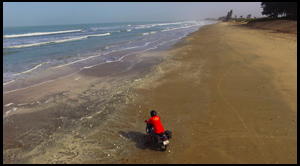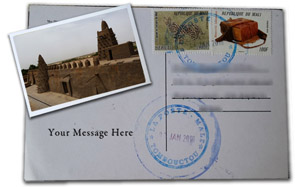On the coast of Cote d’Ivoire, in Abidjan, you can go to a nightclub and dance to coupé-décalé till morning. It is possibly the most frenetic dance music on earth. Get in sync with it and your definition of human movement will change forever (see Dj Arafat’s “kpangor pour bouger” or this dance video of Congolese coupé-décalé).
Before traveling to Abidjan, I spent a week on a beach in western Ghana listening to old recordings of palm wine music, a pre-highlife genre that started in Liberia when guitars showed up. It is mildly danceable, mellifluous and relaxed, with elastic guitar lines and a rhythm that lives on the edge of its time signature. The gentle buzz of palm wine music (and palm wine) did not prepare me for Cote d’Ivoire.
My journey to Abidjan was punctuated by roadside vomiting and 15 too many police checkpoints. For eleven hours, I sat in the bus’ stairwell. I arrived fatigued and in a sense, delirious, with palm wine melodies still playing in my head. Then I heard the radio, and I was blindsided by coupé-décalé. I didn’t like it. The songs were crowded and disorienting. Some days later, I went to a boîte and danced for 4 hours. Then, I understood.
As you travel north from Abidjan, the music changes along with the landscape. Once you arrive in Mali, you are on a different plane entirely. There is plenty of dance music in the Sahel, but there is also a wealth of more meditative music, where rhythm defers to melody, and transcendence comes not from the ecstasy of dance, but from being in the presence of someone baring their soul. This post is about that kind of music.
What I mean to say is that this music is divine. You might be so inspired that you get singing lessons from a place like Takelessons.
This is Na Hawa Doumbia, mother of the singer Doussou Bagayoko, husband to the guitarist Ngou Bagayoko. She is a legendary Wasulu singer from Mali. In Bambara, bana means sickness. Banani is a small sickness. But Banani is also a word for the shea tree, a life giving force. She plays on the duality of the word and from what I can understand, tells us that sickness and life come from the same place and it’s up to us to be guardians of our lives (if you are fluent in Bambara tell me if I am missing anything). As you can tell, from the moments where her voice peaks and cracks, there is much more going on here. What I mean to say is that this music is divine.
Amadou & Mariam are a blind Malian couple who have been writing love songs to each other for the past 30 years. This is the only version of this song I could find on youtube, but for a more stripped down, even heavier version, with a younger Amadou on vocals and a perfect amount of reverb, see track 8 of disc 2 of this album. That album, by the way, is the most impressive of Amadou & Mariam’s international releases. It is voice, guitar and love. Amazon is somehow selling the five discs for $16
.
Tuareg musicians now ply their trade internationally, and Bombino is the latest to share his sounds with the world. When you hear the opening notes of his guitar, you can tell this is something special. I don’t really know what else to say other than I am in awe of this. It comes from the album Agadez and yes, the whole thing is as beautiful as this track.
Salif Keita is often thought of as a kind of world music pop star, but that wasn’t always the case. This collection of songs, known as the “Lost Album,” served as Salif’s initial union with Guinean guitarist Kante Manfila. Salif’s voice is as stratospheric as ever, but there is a lot more to grab hold of in this recording. This is not a casual listening experience. Get some headphones and close your eyes.
Have $10?
This will be the last time I bring this up. Mali Health Organizing Project is sooo close to their fundraising goal. They have until tomorrow. See my write up and interview I did with them to understand why this is such a worthy destination for your money. In short, they are creating a new model for health care delivery in Mali, a model that also changes how we look at the interaction between non-profits and the communities they serve. Each dollar is being matched by a larger donor, and if they get 250 different donors to contribute, they will get a $10,000 bonus. The donation minimum is $10. I visited this organization. I know your money will make an impact. This is not just about Mali or public health issues; this is about creating a replicable model for providing services to marginalized communities.




I can’t tell you how much I enjoy your African music posts!
Glad you like them Andi. Meet me at the Festival in the Desert!!
Love the music, especially the Bombino dude!
Hey Lauren, thanks for stopping by. Bombino is incredible!
I’ve never heard anything like it! It’s truly amazing! Thanks.
Glad you enjoyed 🙂
i listened to all of them. that last one really is journey. i think my favorite was the top one singing to the guitar. i like the message you said the song relayed. “it’s up to us to be the guardians of our lives.” damn straight.
Hey Mack,
thanks for the comment. Yeah the salif song gets in deep. Na Hawa Doumbia is incredible and the words are just as heavy as her voice. Glad you liked it.
Oh you are completely right the music is awesome , I just wish I could spend there a couple of days – at least…:)
Agree with Mack about the Salif Keita song being a journey. Also agree with Lauren that Bombino is my favorite. It’s road music for driving somewhere warm, dusty, and open. Love it.
“It’s road music for driving somewhere warm, dusty, and open.” — perfect!!
Not reeally sure how I missed this post. Certainly one of my favorites. Indeed, there is no doubt irie tunage makes your life better. Love it. See you in DC ina week!!
word. See you friday. Gonna be a fun one..